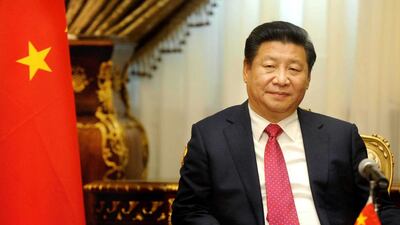Chinese president Xi Jinping has tallied up a lot of frequent-flyer points in recent days. Mr Xi was in Tehran at the weekend, where he met his Iranian counterpart, Hassan Rouhani, and announced plans for economic cooperation worth up to $600 billion (Dh2.2tn) over 10 years. But it’s not just Iran where China is seeking to do business.
Mr Xi has also been to Egypt, where China has spent billions in aid and loans, and expressed support for president Adbel Fattah El Sisi’s efforts to maintain security. He used a media interview in Cairo to call for the establishment of a Palestinian state with East Jerusalem as its capital, and pledged $7.6m towards a solar-power project in the Palestinian territories. China also promised to donate $35m in humanitarian aid to Syria, Lebanon, Jordan, Libya and Yemen.
On this same trip, Mr Xi has been to Saudi Arabia, where he said he hoped to lift “cooperation in various fields to a new level” and announced several new infrastructure projects. The sequential visits to Riyadh and Tehran have come at a time of heightened tensions in this region, with Tehran criticising the execution in Saudi Arabia of a prominent Shia cleric and Riyadh blaming Tehran for allowing protesters to ransack its embassy. The Gulf states have all cut off or scaled back diplomatic relations with Iran.
Mr Xi has been careful not to choose sides in the current dispute. But China cannot sit on the fence for ever if it seeks to be the major power broker in this region. Given its activities across Africa, Asia and the Pacific in recent years, it is clear that Beijing wants to extend its economic influence across the globe. But in doing so, it needs to be careful.
If China wants to replace the United States as the dominant international superpower, then it must have a well-considered world view that includes recognising the poisonous influence Iran is having in the Middle East. Rather than seek to please everyone, China must make firm, consistent and benign foreign-policy decisions.

